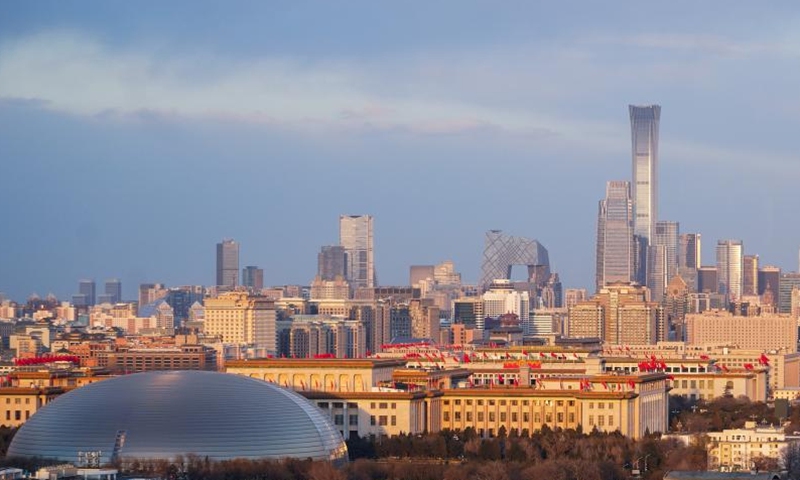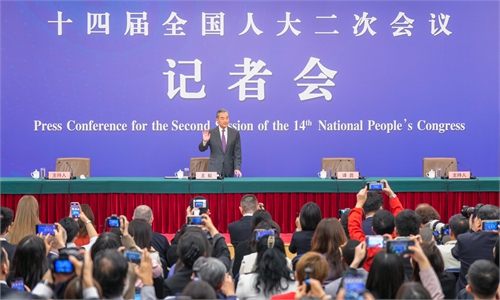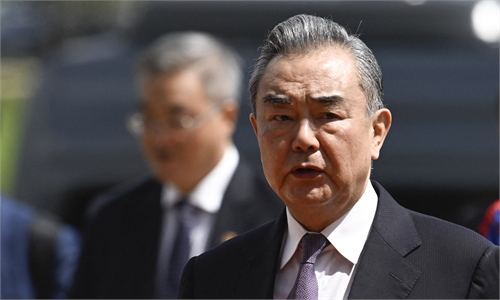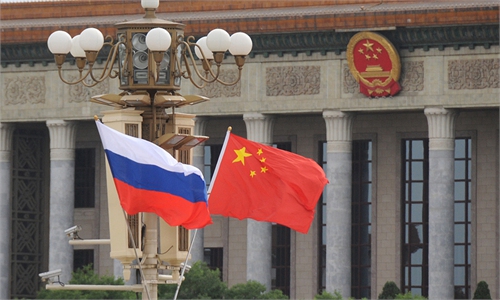Busy 'summer diplomacy' season in China highlights openness, cooperation
Tangible benefits of cooperation help developing countries resist pressure from US hegemony: experts

This photo shows the Great Hall of the People nestled within architectural clusters in Beijing, capital of China. Photo: Xinhua
This week, China is experiencing a busy "summer diplomacy" season, with seven foreign dignitaries from Africa, Europe, Pacific Island countries, and Asia visiting China one after another. This reflects China's stance on opening up to the world and the tangible benefits that practical cooperation brings to the Global South countries. Under the US pressure, some developing countries continue to choose to strengthen ties with China, demonstrating their commitment to independence and resistance to hegemony, some experts said.
A flurry of visitors was mainly from developing countries, who all share close development cooperation with China, particularly under the China-proposed Belt and Road Initiative, experts noted. And cooperation with China has significantly promoted the development and modernization processes in these countries.
Therefore, these countries have shown a strong affinity for China's proactive diplomacy, they said. Despite US' interference, these countries have come to realize, through their own actions and experiences, the disruptive and insincere nature of US policies. These countries have also recognized China's genuine contributions to the Global South.
President Umaro Sissoco Embaló of the Republic of Guinea-Bissau, Minister of Foreign Affairs Maris Sangiampongsa of Thailand, Foreign Minister Maksim Ryzhenkov of Belarus, Prime Minister Charlot Salwai of the Republic of Vanuatu, Prime Minister Jeremiah Manele of Solomon Islands and Prime Minister Sheikh Hasina of the People's Republic of Bangladesh were scheduled to visit China this week, according to China's Foreign Ministry. Prime Minister Viktor Orbán of Hungary paid a flying visit to China on Monday.
Mutually beneficial ties
When Chinese Vice President Han Zheng met with Minister of Foreign Affairs Maris Sangiampongsa of Thailand on Tuesday, he said that China is ready to work with Thailand to follow the important consensus reached by the leaders of the two countries, strengthen high-level exchanges, deepen practical cooperation, enhance people-to-people and cultural exchanges, and promote regional cooperation.
China is also willing to join hands with Thailand to advance high-quality Belt and Road cooperation, and promote the building of a China-Thailand community with a shared future, said Han.
Bangladeshi PM Hasina attended a business forum on Tuesday in Beijing after arriving in the Chinese capital on Monday. She called the Chinese business community to invest in Bangladesh in sectors such as infrastructure, energy and logistics, Bangladeshi media The Daily Star reported on Tuesday.
When introducing Hasina's visit, Chinese Foreign Ministry spokesperson Mao Ning said in an earlier press conference that the visit marks her first visit to China since her new term began and five years after her last visit to China.
China and Bangladesh are good neighbors, good friends and good partners. We have similar visions for development and well-aligned development strategies, Mao said.
Since the establishment of diplomatic relations 49 years ago, the two countries have treated each other with respect and equality, engaged in mutually beneficial cooperation, supported each other on issues concerning our respective core interests, and jointly advanced modernization. "We have set a good example of friendship and cooperation between developing countries," the spokesperson noted.
"China is engaging closely with countries that have different social systems, cultural backgrounds, histories, and levels of development. This demonstrates that even with different systems, China can build strong connections and establish an open partnership," Yang Xiyu, a senior research fellow at the China Institute of International Studies, told the Global Times on Tuesday.
"It also reflects a major characteristic of Chinese diplomacy: strengthening bilateral diplomacy while using various bilateral platforms to advance global openness and inclusiveness," Yang said.
In a meeting with Chinese Foreign Minister Wang Yi on Monday, Foreign Minister of Belarus Maksim Ryzhenkov said Belarus greatly appreciates and will continue to participate deeply in the series of global initiatives proposed by China, and adhere to the practice of multilateralism to jointly address global challenges.
Also, some experts anticipated that the visits of the leaders from Vanuatu and Solomon Islands will further strengthen the relations between China and the Pacific Island countries (PICs) to a higher level, as there is still great potential for further cooperation.
"China's cooperation with Global South countries is based on practical and effective outcomes, not just verbal commitments," Li Haidong, a professor at the China Foreign Affairs University, told the Global Times on Tuesday.
China's diplomacy is multifaceted and covers all regions, and the scope of China's diplomatic engagement is extensive, covering a wide range of fields, Li said. He noted that although some developing countries have been disturbed by the US policies when they cooperate with China, they have recognized tangible results through mutually beneficial cooperation.
The US has been increasing pressure on the PICs by citing the so-called growing influence of China in the region. In March, for example, the US Assistant Secretary of State for East Asian and Pacific Affairs Daniel Kritenbrink told the Senate Foreign Relations Committee the US had already opened two of the four new embassies it had announced plans for in the region, Reuters reported.
Earlier in the hearing, the ranking member of the Senate committee, Republican James Risch, said Washington had "been too slow to get our diplomats permanently on the ground to push back against Chinese influence" in the Pacific, the media report said.
Despite the pressure exerted by the US on these developing countries in the South Pacific Ocean, urging them to take sides based on geopolitical and Cold War mentality, China's cooperation with these countries has brought them tangible development results, which are evident to all, Song Wei, a professor at the School of International Relations and Diplomacy at the Beijing Foreign Studies University, told the Global Times on Tuesday.
"From the perspective of their own development strategies, these countries have chosen to continue strengthening their development cooperation with China, sharing the opportunities brought about by China's rapid development and learning from China's development experience," Song said.
In commenting on Orban's visit to Beijing, Chinese Foreign Ministry spokesperson Lin Jian said at a routine press conference on Tuesday that China appreciates Hungary's constructive efforts to promote a political solution to the Ukraine crisis.
China will continue to promote peace and negotiations in its own way, playing a constructive role in seeking a political resolution to the crisis, Lin said.
Sharp contrast
While China is hosting these foreign dignitaries from developing countries this week, the US is using the 2024 NATO summit to hype up the "threats" posed by Russia and by China, stepping up efforts in forming small cliques in the "Indo-Pacific" region. Some experts said Beijing's aspiration of establishing open partnership relations strikes a sharp contrast with the Washington-led bloc confrontation that creates division, turmoil and conflict around the world.
NATO is set to deepen relations with its four "Indo-Pacific" partners, and the US has been working to break down barriers between European alliances, Asian coalitions and other partners worldwide, the AP reported on Monday.
"Our diplomatic activities demonstrate that we oppose bloc confrontations. We hope to and are working toward practicing the principle of sovereign equality of all countries globally, avoiding the mind-set of handling international relations through hostile camps," Li said.
NATO, on the other hand, is a military alliance that maintains US hegemony and supports the West's dominant role in global affairs, which is an exclusive alliance with specific enemies and clear objectives, Li noted. "China's diplomatic philosophy and practices are fundamentally different from those of NATO."
While NATO creates division, turmoil, conflict, and war in the world, China aims to bring lasting stability, prosperity, security, indivisibility, and ultimately the goal of a community with a shared future for mankind, Li said.



